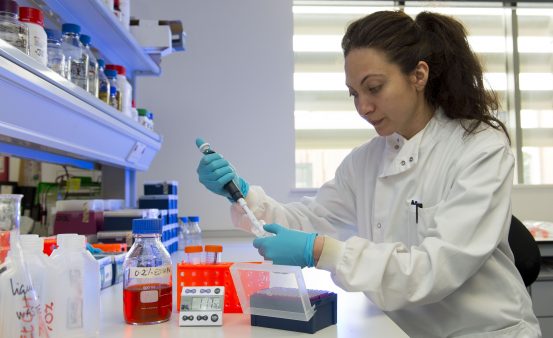FRAGMATIC: Results of the Largest UK Trial of Lung Cancer Patients with Low Molecular Weight Heparin
9 February 2016
The results of the Fragmatic trial were recently published in the Journal of Clinical Oncology. The trial was funded by Cancer Research UK with support from Pfizer to answer this question: ‘Should all newly diagnosed people with lung cancer be offered daily injections of a drug called dalteparin for six months to improve survival and prevent blood clots.’
One of the paper’s authors, Fergus Macbeth, reflects on the importance of the research.
In 2005 the results from small trials in patients with small cell lung cancer, supported by indirect evidence from large trials including patients with a variety of cancers, suggested that giving drugs that prevent clots might improve survival. Patients with lung cancer are more at risk of blood clot, especially when having surgery or chemotherapy.
Laboratory studies also suggested that a specific class of these drugs, heparins, might prevent the formation and growth of metastases (cancer spread). We therefore thought there might be two ways in which dalteparin (a form of heparin) might prevent serious problems: it might prevent fatal blood clots in patients at high risk and it might prevent the spread of cancer. But this theory needed to be tested with a large randomised trial.
So we designed the trial to include newly diagnosed lung cancer patients of any type and extent of spread who, if they consented to enter the trial, would receive either daily injections of dalteparin for 26 weeks or no dalteparin in addition to their standard treatment. Patients, or relatives, were trained to give the injections themselves.
Over 4 years, we recruited 2,202 patients from centres all around the UK, making this one of the largest ever randomised trials in lung cancer patients. When we analysed the results we found that there was no difference in the number of patients alive at the end of one year following diagnosis and there was no suggestion that those who received dalteparin were living longer. The risk of developing a potentially serious blood clot was reduced by half in those having dalteparin but the risk was lower than we expected (10%) and there was an increase in the risk of bleeding problems.
When we looked a specific groups of patients (including those with small cell lung cancer) there was no suggestion that any group might be benefitting from the treatment. We tried to get a broadly representative group of lung cancer patients, but there were very few who had surgery and none who were very ill at the time of diagnosis. So it is still possible that are groups of patients who might benefit from routine use of dalteparin or similar drugs.
Although the results of this trial may seem disappointing and ‘negative’, they are, however, very important. This is the first trial large enough to answer this question for any tumour type and does give a very clear result. So teams around the world may have to rethink their research strategies in this area.
We are very grateful to all the patients, doctors and nurses and staff of the Wales Cancer Trials Unit who helped make this trial a success and to Cancer Research UK for providing the funding.
- June 2024
- May 2024
- April 2024
- March 2024
- December 2023
- November 2023
- September 2023
- July 2023
- June 2023
- April 2023
- March 2023
- February 2023
- December 2022
- November 2022
- October 2022
- September 2022
- August 2022
- July 2022
- June 2022
- May 2022
- April 2022
- March 2022
- February 2022
- January 2022
- November 2021
- September 2021
- July 2021
- June 2021
- May 2021
- March 2021
- February 2021
- December 2020
- November 2020
- September 2020
- August 2020
- July 2020
- January 2020
- December 2019
- October 2019
- September 2019
- July 2019
- June 2019
- May 2019
- April 2019
- February 2019
- December 2018
- November 2018
- October 2018
- September 2018
- August 2018
- July 2018
- June 2018
- May 2018
- April 2018
- March 2018
- December 2017
- October 2017
- August 2017
- July 2017
- June 2017
- May 2017
- April 2017
- March 2017
- February 2017
- January 2017
- December 2016
- October 2016
- August 2016
- June 2016
- April 2016
- March 2016
- February 2016